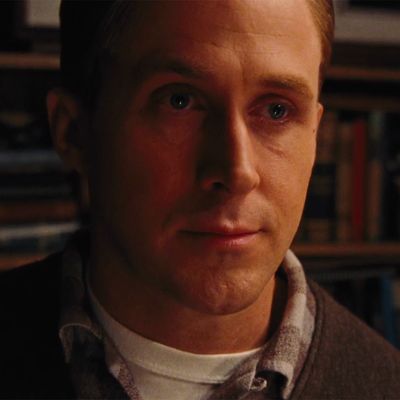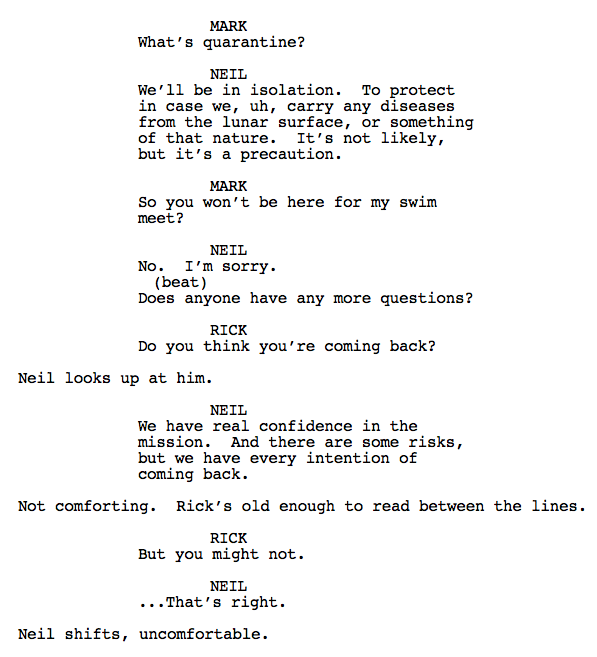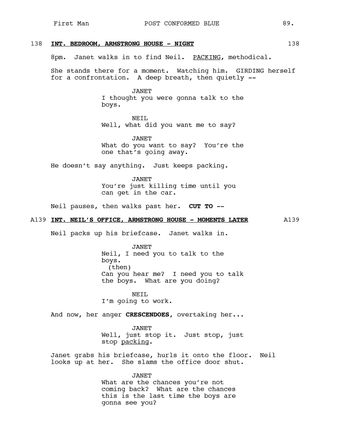
Once again, Vulture is speaking to the screenwriters behind the awards season’s most acclaimed movies about the scenes they found most difficult to crack. Our first post of the year takes a look at one of the standout sequences of Damien Chazelle’s First Man, in which Janet Armstrong (Claire Foy) forces her husband, Neil (Ryan Gosling), to explain to their sons that he might not come back from the moon mission. How do you write an argument scene when your main character is a man who never raised his voice? As screenwriter Josh Singer explains, it helps when the real Armstrong boys are working with you to nail the specific dynamics of their family.
This scene is such delicate material because of the work required with Mark and Rick [Armstrong’s sons, who consulted on the project]. Neil is such a closed-off emotionally, tightly packed individual, that actually getting underneath his skin is extraordinarily difficult.
One of the wonderful things when you write these pieces is, you actually start to get into the minds of these people, what they actually grappled with. If you’re Janet Armstrong, your best friend is Pat White, who lives across the street. When Ed White goes up in Gemini 4, you’re holding her hand. Then, when Ed dies, you see that Pat is not the same person she was. You see that every day. And the last time your husband went up in space, he almost died, and that mission was a much more routine mission than this is. So you know she’s gonna be all the way wound up, and Neil is going to be the opposite.
It’s a strange fight because Neil doesn’t fight back. Typically, when you write a fight scene, you want both sides to have good arguments and be going at each other. And Neil just isn’t that guy. One of the things Rick said early on was that a “no” from dad was a huge argument. That was a big deal. Most of the time, you’d ask him a question and he just wouldn’t respond. Clearly, here’s a guy who, because of all the tragedy and loss, had forced himself to become further and further emotionally removed from everyone around him. You’ve got to write a scene where he’s just taking every punch and diffusing, which is not exactly high drama.
Where am I getting this scene about the fight? It’s a combination of something Janet said to James Hansen, basically saying she had pushed Neil to talk to the boys, and then we had the boys saying, “Yeah, dad sat us down.” Janet had lost her dad when she was 15, and she didn’t want the boys to go through that. God forbid anything happen to Neil, she didn’t want him not to say anything.
I reworked this scene probably three dozen times with Damien, and then another dozen times with Damien and Claire. The funny thing about this scene is, I was there for about 90 percent of shooting, but there was a little bit where I had to be other places because of The Post. One of the producers called me freaking out because there was a fair amount of ad-lib when they shot this fight. If you look at the words that are actually in the movie now, I’d say around half to three-quarters of it is scripted, and there’s a bunch that they are making up. So one of the things I did was, I watched the dailies with the sound off. I didn’t want to react to the words, I wanted to react to the emotional feeling in the moment. And it was all there — she’s trying to control this uncontrollable fear, and he’s trying to avoid it. Are the words as pretty as if I had written them perfectly? Probably not, but I’m sure the words in that actual argument were not as pretty as if I had written them perfectly.
This was all on the day. What I loved about it when I saw it, it was like, Yeah, that’s exactly right. Neil would be avoiding her. Neil is gonna be doing everything in his power not to think about it. He’s just trying to pack and do his job. He doesn’t want to talk to the boys, but he’s never gonna get in an argument about it.
This was all scripted. Something I like to do on these sort of pieces is, because getting it right is so important, I spread the script around. We had Mark and Rick read it twice, and Rick literally went over every page with Janet. And this whole set of scenes, Mark did a rewrite, so we got his perspective on how to demonstrate things. Even more useful was the back-and-forth, so we could learn what the hot buttons were: “Dad wouldn’t have said this; he would have said it like this.”
Right before Rick and Mark saw the film, I sent the script to them again, just so they aren’t surprised by anything when they watched the film. I get an email from Rick with notes, and one of the things he said was, “In the fight with mom and dad, mom drops the F-bomb, and I’m pretty sure she wouldn’t have.” And I read this and I want to die. We can’t cut that. The line is great. Claire is great. So we get into the screening and we get to the fight scene, and as soon as the scene ends I hit the pause button, and I’m literally cowering under my hat. Mark looks at me and smiles and says, “How can we argue with that?”
There’s a bunch of stuff that we worked on with Claire that didn’t make it. Do we say something about the fact that her father died when she was 15? We tried to get it in there because it helps explain a little bit of where she’s coming from, but ultimately, not only is it on-the-nose, but you don’t need it.
“What are the chances that’s gonna be Ricky and Mark?” — we always had something along those lines, but I never wrote them like that. And looking at them now, they’re a little broad. But what’s wonderful about the performance is that Claire gets ‘em across. The version of these lines on the page, we never felt they were exactly what they should be, but then Claire does it and she’s magical. The joy of filmmaking is when you get actors who can make stuff work that is not 100 percent.
I wrote this next scene. Damien had a pretty good idea of what he wanted here: We had this idea in our heads, which is that Neil is as tense as you’re ever going to see him, sitting in front of the boys. He’d rather be strapped to a rocket than be at the table facing those boys. This is a guy who is trying to distance himself from emotion, and you’ve got nothing but pure emotion coming from these kids.
So I wrote the first draft of this scene, and I set it in the bedroom: Neil and Janet come into the boys’ bedroom, and they’re in pajamas. The first thing Rick and Mark said was, “No, it was the dining room. And we remember it was the dining room because it was weird that it was in the dining room.” That’s great! Suddenly it’s more formal in this really cool way.
The second thing Rick and Mark said was, “What you have dad saying here is just wrong.” I can’t remember the original line, but it was slightly colder. I asked them what he said, and Rick gave me the line: “We have real confidence in the mission, and there are some risks, but we have every intention of coming back.” He wasn’t 100 percent, but he was pretty sure that’s what Neil said. And it’s one of the greatest lines in the piece because it’s just so clinical. It was softer than what I originally had, but on the other hand, it was more formal, which was perfect. Once Rick gave me that line, I knew how he was talking to them in the rest of the scene. It wasn’t monosyllabic. It wasn’t terse and dark. It was clinical. And I think the last bit — “It’s not likely, but it’s a precaution” — might have been an ad-lib by Ryan, which is great.
The one thing we agreed to disagree on was, there wasn’t a “Do you think you’ll come back?” It was just Neil at the top of the conversation saying this thing. But we just wanted to put that question in Rick’s mouth because we wanted to feel it in a slightly more emotional way. And it was clear that was something Rick and Mark could live with. It was slightly more dramatic, but we’re still in the spirit of what happened.
We were always going to open the movie on the X-15. And it was pretty clear early on that Gemini 8 was going to be the midpoint. Damien said, with Gemini 8 we can cut away, but for Apollo 11, I want to be on that journey. We’re never gonna change our POV, we’ve never gonna cut to Janet. So that puts even more pressure on these scenes. We see Janet when we come back, but this is the last time we see the boys. This is our good-bye to them.
When NASA first read the script, they were pretty nervous. When Dave Scott read these scenes, he hated them. It’s not exactly the warmest family portrait. And the fact that Mark and Rick were behind this film … They love their father, but this is what he was like. They say, “People ask us what it was like growing up in that household, and now we have an answer.” That, to me, is the whole ball of wax.
Below, read the scripted version of the scenes:
Now see how the scenes play out in the finished film:













